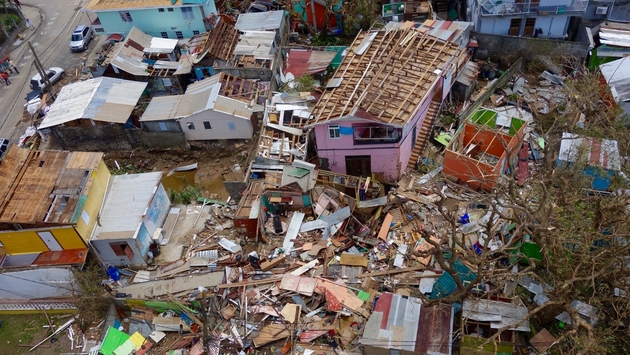Small island states need more financial support

In September 2017, Hurricane Maria caused the largest storm-related economic disaster on the Caribbean island of Dominica, with per capita damage measured. Unctad warns that small islands also bear the heavy burden of the epidemic and external debt. Photo: Ben Parker / IRIN
Small island developing states (SIDS), victims of frequent storms and economies severely affected by the Coronavirus, need more financial support to diversify their exports and increase their resilience in the face of crises, according to a report released on Monday 11 by Unctad.
“Prior to COVID-19, SIDS already faced significant constraints in mobilizing adequate resources to achieve sustainability,” said Paul Akiwumi, Director of Africa and Least Developed Countries at Unctad (United Nations Conference on Trade and Development).
With the pandemic, the fragile economies that depend on tourism, which have collapsed in most SIDS, threaten to put them “in a trap”, as they do not have the resources to recover from disasters and, moreover, do not cover servicing their external debt, Akiyumi said.
Tourism accounts for more than 50 percent of GDP in islands such as the Maldives or Seychelles, more than 30 percent in Antigua and Barbuda, Vanuatu or Saint Lucia, and more than 20 percent in Fiji or Cape Verde.
During the year 2020, which has been marked by the coronavirus crisis, the gross domestic product of small island developing states decreased by an average of nine percent, according to the International Monetary Fund.
The United Nations warns that the external debt crisis is looming in many of those 52 countries and territories, including 39 independent states in the Caribbean, the Pacific, Africa and the Indian Ocean.
For example, Jamaica and Seychelles have external debt equal to or greater than 100 percent of their GDP, Cape Verde and Papua New Guinea around 80 percent, or Grenada, Samoa and Dominica at more than 50 percent.
Akoumi warned that the debt burden harms the availability of resources to recover from potential disasters, because failure to service these obligations will affect eligibility for future funding.
In December 2020, Fiji was hit by Cyclone Yasa, the second Category 5 storm this year, destroying hundreds of buildings and damaging nearly $ 1.4 billion, a quarter of its GDP, to health facilities, homes, schools and agriculture. And infrastructure.
If it happened in the Pacific, the Atlantic region also had its most active hurricane season ever, and although it hit Central America first of all, it is in the reclusive Caribbean that has raised concerns about a repeat of the 2017 episodes.
In September 2017, Hurricane Maria struck the northeastern Caribbean, particularly Dominica, Puerto Rico and the US Virgin Islands, killing hundreds of people (at least 64 people in Puerto Rico and 62 in Dominica) and caused extensive damage.
In terms of economic impact, calculated on a per capita basis, Maria was the fiercest storm in history to hit Dominica, with damage equivalent to 280 percent of the island’s GDP, according to Unctad.
I note that Samoa, Tonga and Saint Lucia have suffered extremely heavy losses in terms of GDP and percentage of the population affected by storms in the past 30 years.
For small countries, the costs of rebuilding after a disaster can be prohibitive. On average, natural disasters cause damage equivalent to 2.1 percent of GDP each year in small island developing states.
“Connectivity to the ocean is both an asset and a risk for SIDS on the frontlines of climate change,” said Dora Bertarelli, Unctad’s advisor on the blue economy, and called for cooperation “to help them develop multidimensional resilience. Confronting the environment and economic challenges.”
This flexibility requires both small island developing States to strive to diversify their income and international financing providers to consider new approaches to these countries, such as preventive disaster financing.
“Previous approaches focused on post-recovery and emergency-based financing, but pre-financing should also be a priority for resilience-building efforts,” Akiyo said.
One of the formulas favored by Unctad is the expansion of “debt-for-nature swaps” or agreements between debtors and creditors to reduce a developing country’s debt stock or service in exchange for a commitment to protecting nature, which is commensurate with the characteristics of small businesses. Island states.
AE / HM

“Award-winning zombie scholar. Music practitioner. Food expert. Troublemaker.”









